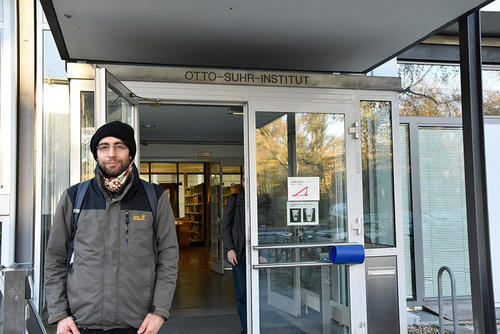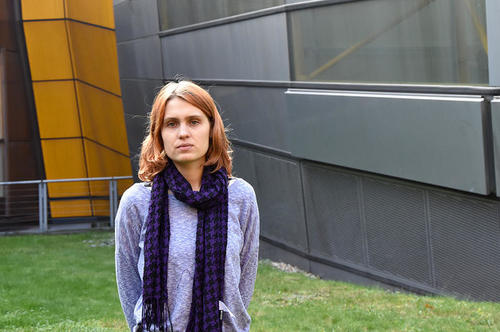Raising Awareness
Imad Alsoos and Katarzyna Lisowska have done research within the Research Alumni Program at Freie Universität
Dec 17, 2015
Just back from doing research in Amsterdam: Imad Al Soos is working on a doctorate in political science at the Otto Suhr Institute of Freie Universität Berlin.
Image Credit: Peter Schraeder
What benefits can groups gain from telling their shared traumatic stories? How do people talk in literary form about things that lie hidden in public life? Two doctoral candidates, Imad Alsoos and Katarzyna Lisowska, ask big questions.
Alsoos studies the ideology of Hamas, while Lisowska does research on metaphors as part of the discourse of gender studies. The Freie Universität Research Alumni Program is helping both of them to advance their projects during a research stay this year.
Research alumni are scholars and scientists who have worked at Freie Universität on a visiting basis for a certain period and are now continuing their research in another country. Research alumni can be highly important to the expansion and success of international cooperative research relationships. And these alumni, most of whom already hold established positions, can function in particular as door openers and partners for junior scholars and scientists, helping them to build their own cooperative relationships. This is where the Research Alumni Program of Freie Universität comes in, with targeted support for guest stays by junior scholars and scientists.
Katarzyna Lisowska in front of the Philological Library of Freie Universität Berlin, where she did research for her doctoral thesis.
Image Credit: Peter Schraeder
Lisowska and Alsoos, for their part, also heard about the exchange program from research alumni. Alsoos, who is Palestinian, has worked for several years at the Otto Suhr Institute at Freie Universität, where he is about to complete his dissertation. It was there that he met visiting scholar Ihab Saloul, who continued his research in Amsterdam after his time at Freie Universität. At his invitation, Alsoos spent eight weeks in the Netherlands with the Research Alumni Program last summer.
Images of the Invisible
Lisowska studied in Wrocław, Poland, where she is now also earning her doctorate. In her case, it was the advisor for her doctoral colloquium, Wojciech Małecki, who had done research at the John F. Kennedy Institute himself. Lisowska spent four weeks in October doing research for her dissertation here at the invitation of Frank Kelleter, who was her doctoral advisor’s cooperation partner at the time. She also attended seminars on feminism, pursuing her existing focus on gender studies as part of her studies of literature.
In her dissertation, Lisowska has combined both fields, writing about metaphors in Polish gender studies discourse. To do this, she is analyzing texts by contemporary Polish authors such as Izabela Filipiak and Piotr Sobolczyk while also studying how the American discourse has affected Polish gender studies. “Here at the institute, I was able to use many American sources in the original language for this,” she says.
One example: “coming out of the closet” is a common metaphor in the discourse of gender in English. The term applies to the process by which people – usually homosexuals – become aware of their sexuality and communicate it to those around them. There is an equivalent phrase in Polish, literally “to come out of the wardrobe.” Other figures of speech make reference to theatre as a kind of intermediate world. “These metaphors show something unclear or invisible,” Lisowska explains.
Touching Others by Telling Stories
Alsoos, too, studied literature. He then went on to earn a master’s degree in International Studies. In his dissertation, he is now studying the sociopolitical mobilization of Hamas. With his colleague Saloul in Amsterdam, he asked how Hamas utilizes the collective memory of Palestinians to mobilize the populace. The results will be published in a joint article.
“After the state of Israel was founded, many Palestinians had to leave their homeland,” Alsoos explains. His parents were among them. It is the stories that are told about this period and the way in which they are told that especially interest him. “People talk about how they lost their home, their money, or even their children,” Alsoos says. Hamas wants to keep the memory of this traumatic past alive. This is part of the mobilization process. By telling stories, Alsoos says, it is possible to “touch others.”
The positive response to his dissertation project in Amsterdam and the suggestions he received from scholars there were highly encouraging to Alsoos. Lisowska, too, is returning to the university in Wrocław with a richer perspective after her time at Freie Universität. And perhaps the connections they have forged will lead to even more exciting projects, further expanding the network of junior scholars and scientists and research alumni.


